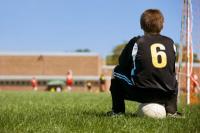Buy fish for the garden pond
Finally, the pond is ready, dug, filled and planted. Now fish should move in. But which ones are suitable for which garden pond?

What you need:
- Information about the type of fish you want to buy
Goldfish are popular fish for the garden pond. But it doesn't always have to be just this. Even among the native species, some are good for you pond suitable in the garden.
Native fish for small and medium-sized ponds
- Among the native species, there are several that you can put in a small or medium-sized pond. The rule of thumb is about 50 liters of water for two centimeters of fish. In addition, your garden pond should be at least one meter deep so that your animals can overwinter in it.
- Bitterlings (Rhodeus sericeus amarus sym. Rhodes amarus). They are only about seven centimeters tall, eat plants, water fleas and fodder flakes and feel most comfortable in a small flock of at least five animals. Their breeding behavior is special, because the females lay their eggs in mussels with the help of a laying tube. So buy some pond clams or others right away. Since the stock of mussels is falling sharply in polluted waters, bitterlings are also endangered as a result.
- Two other species that remain small are Moderlieschen (Leucaspius delineatus) and minnow (Phoxinus phoxinus). With a length of nine to ten centimeters, the schooling fish can also live in a smaller pond. So you should buy at least ten animals. Both are undemanding when it comes to food. They eat aquatic plants and such from the trade.
- With the Moderlieschen, pay attention to the population. They multiply rapidly, and the fish can cope with higher temperatures in summer. Minnows like it a little cooler and need clear, clean water. A pond filter is popular here. Both species like to swim just below the surface of the water, a protection against Cats so may be necessary.
Goldfish - keeping in the garden pond
Many people want goldfish as an ornament for their garden pond and forget ...
Species for a large garden pond
- Tench (Tinca tinca) and Orfe (Leuciscus idus) are two species that can grow up to 50 centimeters. The tench can be kept individually, you should buy at least six specimens from Orfen, as they are lively schooling fish. They eat small aquatic animals and flakes of food. As an omnivore, the Schlei also takes Snails. He likes to root on the ground. As a crepuscular and nocturnal animal, you will seldom see it in a large garden pond.
- The valuable Koi (Cyprinus carpio) are also large specimens. They too only feel comfortable in a group. A koi can be up to 80 centimeters long. They are therefore only partially suitable fish for really spacious ponds. They quickly pollute the water. It doesn't work without a powerful filter system. The sterlet (Acipenser ruthenus), which belongs to the group of sturgeons, is just as large. Unlike the Koi, the animals prefer it cool. They love flowing water. Keeping koi and sterlet together in a pond is not recommended. For large animals, the pond must be deeper than for the species described above.
- And what about the goldfish, which probably populate our garden waters most often? They also reach the stately size of 30 centimeters. There are various forms of breeding among sociable animals. Not all are robust enough to overwinter in the pond. Let us advise you which shapes are suitable for you.
Fish that do not belong in the garden pond
- If you have a grass carp (Ctenopharyngodon idelle) in mind to destroy algae, be careful. They grow up to a meter in size and devour in front of the Seaweed first of all everything else that can be found in plant-based food. If you don't have any problems with that, you can keep such an animal in a large pond. Most gardeners, however, want a naturally planted water paradise. The selection of fish should be adapted to this.
- The three-pronged stickleback (Gasterosteus aculeatus) can also be problematic. At the latest when you have a large number of the reproductive journeyman in the pond. The males defend their territory several times a year during the breeding season against larger species. This leads to restlessness and stress in them. In addition, sticklebacks are very voracious predators. All other small organisms are destroyed by them. Tadpoles don't stand a chance there.
- The perch (Perca fluviatilis) is just as predatory. If he finds enough food, he will soon be up to 40 centimeters tall. Newts, frogs and small coarse fish become its victims. Such a predator is only partially suitable for the pond in the garden.
- If you want to buy fish for your garden pond, inform yourself thoroughly before buying them. They are living beings and pets, just like our cats dogs, Guinea pigs, birds and others. They have to live in the habitat that you artificially create for them. Not every pond is suitable for all desired animals.
How helpful do you find this article?

